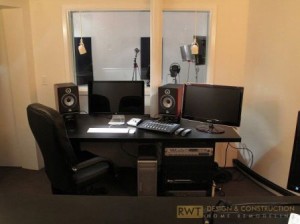BUILDING YOUR OWN HOME RECORDING STUDIO…IS IT A GOOD IDEA?
Los Angeles has long been home to the music industry and independent artists and musicians. The...
Los Angeles has long been home to the music industry and independent artists and musicians. The...
 In the Burbank area, home remodeling often includes renovating to create your very own recording studio. No matter how novice or professional your current music-making level (and how lofty your aspirations!), this is definitely a purpose-built space that can be customized to suit your precise needs.
In the Burbank area, home remodeling often includes renovating to create your very own recording studio. No matter how novice or professional your current music-making level (and how lofty your aspirations!), this is definitely a purpose-built space that can be customized to suit your precise needs.
For most people, one of the most attractive and enjoyable parts of the home remodeling process is brainstorming about both the overall design and specific details to make the space completely their own. A recording studio is no exception, and in fact provides even more opportunity to focus on technical particulars than most construction projects on the home front.
Whether your focus is vocal, instrumental or a combination of the two, you want to be fully prepared to make every note sound superb. To say that there is a vast array of design options is an understatement. Aside from the overall look and feel of your personal recording studio, however, this one’s also about way more than just appearance. Fantastic functionality is a huge priority; more importantly, the recording studio should be customized for your needs.
Here are some things to think about:
To assure you have clean power to your recording equipment you need to run dedicated circuits with isolated grounds. Recording gear today for the most part is computer based and having a clean power source will improve the quality of your recording.
You will also need a clean power source for any instruments that may be plugged into your recording studio system.
Carpeting with extra thick padding is a traditional recording studio standard. The idea being “the squishier the better”. What this does is it absorbs the sound waves before they hit your sub floor surface, whether it be concrete slab or a raised foundation. With today’s newer materials, we are moving more towards eco-friendly, recycled products that are made specifically for floor sound proofing treatments.
When designing your electrical and lighting systems for your recording studio, here are some things to consider:
1) Make sure you have isolated circuits “ dedicated” with an isolated ground for recording gear, amplifiers and musical instruments.
2) The lighting should be designed with fixtures that are surface mount rather than recessed (LED bulbs create little to no heat).
To build a legal professional recording studio “with permits” you first have to check with Building and Safety and Plan Check and Zoning.
In Los Angeles for example we have run into several locations that had specific restrictions for recording studios and rehearsal rooms. Of course, this will cost you either your time or if you hire a professional a little bit of money but it is important before you enter into a lease or the planning phase of your recording studio, that you have verified your zoning requirements.
Something to consider when building a sound proof recording studio is to provide proper ventilation, air conditioning and heating to the spaces. Since the rooms will have air tight seals for doors and windows, you must have proper ventilation and fresh air for your artists and engineers.
The best way to accomplish this is by having a separate fresh air supply blower and a separate exhaust fan blower. This way you can exchange the stale air with fresh air on a constant basis.
A proper recording studio design would include not only wall, ceiling and floor sound proofing but would also include layout for the following:
1) ISO Booth
2) Live Room
3) Control Room
Musicians and recording engineers can save tens of thousands of dollars by building an in-home recording studio.
With the cost of professional studios rising building your own in- home recording studio can be a viable option.
First thing you should do is check with your local government agency to make sure your recording studio can be legally permitted and installed.
Next, put together a budget of what it is you would like to spend on your recording studio. Note, a min budget of 5,000 would be needed to even get started and 20,000 to 50,000 would be the average cost for a home recording studio.